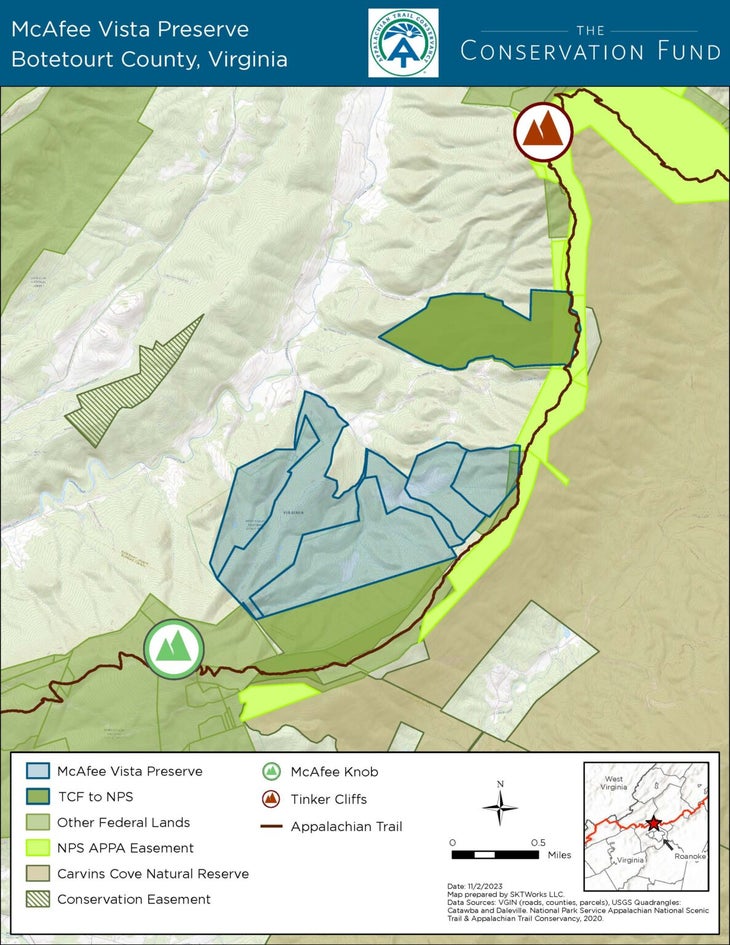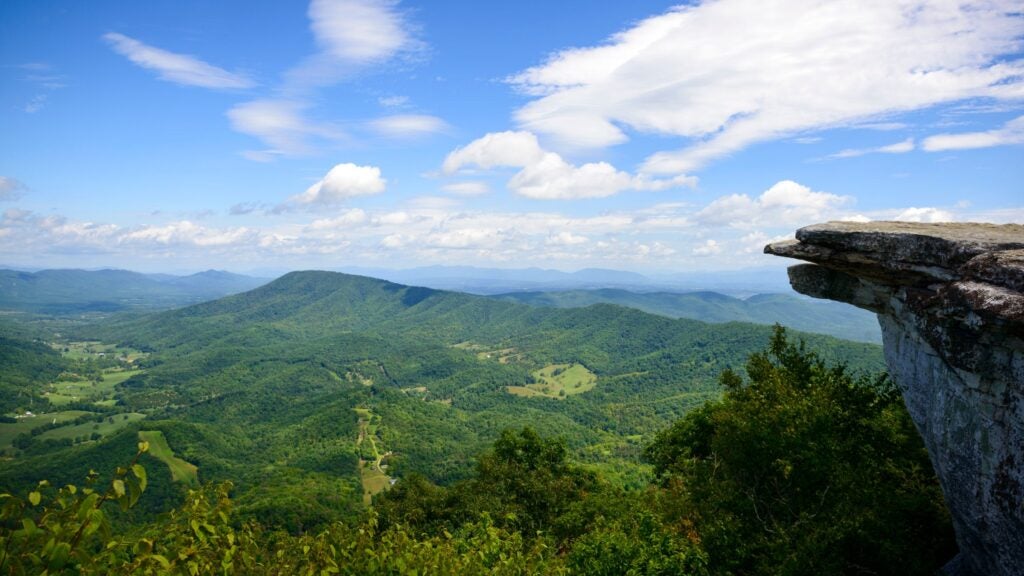No products in the cart.
Outdoor Adventure
One of the Appalachian Trail’s Most Iconic Views Is Now Protected Forever
Heading out the door? Read this article on the Outside app available now on iOS devices for members!
Download the app.
Virginia’s McAfee Knob is arguably the most famous view on the Appalachian Trail, a jutting diving board of stone overlooking a miles-long panorama of forested ridges and valleys that thousands of hikers drink in every year. Now, much of that view will be protected permanently, thanks to a new deal that will see a partnership of two conservation organizations acquire 850 acres of the land below.
In a press release, the Appalachian Trail Conservancy (ATC) said that it and The Conservation Fund had finalized a deal to purchase the land—which it has dubbed the McAfee Vista Preserve—from six different landowners. Besides preserving the view from the trail, the ATC said it would use the land to support wildlife restoration efforts.
“Assembling these properties into a contiguous, protected landscape under McAfee Knob was a labor of love for all involved,” Heather Richards, The Conservation Fund’s mid-Atlantic regional director, said in the statement. “In working with our partners at ATC and the landowners who demonstrated a remarkable commitment to conservation and a strong land ethic, we celebrate now that this land will remain undeveloped as it contributes to the hiker experience along one of America’s greatest trails.”

Even on one of America’s most-hiked long trails, McAfee Knob stands out for its popularity. Visit Virginia’s Blue Ridge estimates that 50,000 visitors come to the spot every year, whether as thru-hikers or day-trippers making the 8-mile round trip. It is so iconic that when Google featured the Appalachian Trail in the Doodle on their homepage in October, they used an illustration of McAfee Knob.
At times, the popularity of the spot has become problematic. Last year, the National Park Service announced it was seeking public input on a possible new management plan for the “Virginia Triple Crown,” which includes McAfee as well as nearby Tinker Cliffs and the Dragon’s Tooth; among other ideas, officials floated the possibility of adding new campsites, rerouting the trail, “actively managing” parking, and adding hiker shuttles. And in 2021, the Roanoake Appalachian Trail Club posted a warning on its Facebook page that “the large amount of food garbage left in the McAfee Knob area” had begun to attract bears.
This week’s acquisition is just the latest in a series of purchases that the ATC has made to conserve the views from McAfee and other nearby viewpoints. The organization said that, along with The Conservation Fund and the Roanoke Appalachian Trail Club, it had purchased roughly 1,300 acres from 10 different landowners over the past four years, including a 243-acre tract known as Hogan Hollow in 2019.
The ATC’s purchase of the McAfee Vista Preserve hasn’t been without controversy. Much of the money for the deal came from the company behind the Mountain Valley Pipeline (MVP), an under-construction, 300-mile project that would cross the Appalachian Trail and run near it for hundreds of miles. The pipeline faced challenges in court from organizations including the Sierra Club, and suffered some initial setbacks before a federal budget deal in June fast-tracked the MVP’s completion by barring courts from reviewing most potential permit violations connected to the project.
While the ATC initially vocally opposed the MVP, in 2020 the group entered into a “voluntary stewardship agreement” with the pipeline’s developers, which included a deal to fund the ATC’s conservation efforts to the tune of $19.5 million. (The ATC has so far declined to make the text of the agreement public, stating that the group had agreed during negotiations to keep the details confidential and that releasing it would damage their credibility.)
In an interview with Clay Bonnyman Evans of The Trek published in 2018, Andrew Downs, the ATC’s senior regional director for the south, said that the organization had entered talks with the MVP’s developers after a court decision that year made it clear that their concerns about potential impacts to the trail were unlikely to stop the pipeline’s construction.
“That kind of told us, ‘Hey, the AT will bear some impact from the pipeline and we can’t stop it. … If all we are going to get is nothing, let’s get the best deal we can,’” he said. “This is not necessarily where we wanted to end up from the beginning.”
Besides funding from the MVP, the ATC said that Virginia Outdoors Foundation’s Forest CORE Fund and donations from their and the Roanoke Appalachian Trail Club’s members had made the purchase possible.
Source link

